- Home
- William Ritter
Ghostly Echoes Page 17
Ghostly Echoes Read online
Page 17
“I haven’t died,” I told her. “Dark forces are operating in New Fiddleham. People have been murdered, and Jackaby thinks that worse is on the way. I’m looking for answers.”
“Oh, Abby!” Nellie held a hand to her chest. She looked like she was watching her child’s first steps. “You followed a lead into the great beyond? God, you are like a young me. I’m so proud of you, sweetie. This place is great for answers. I tracked down the Borden parents right off. It turns out little Lizzie didn’t do it, after all. They’re a very nice couple, by the way. I hope their girl gets acquitted. She’s been through quite enough. So, who are you looking for?”
“I need to find a professor, a man named Hoole. I don’t suppose . . . ?”
“Sorry.” She shook her head. “Never heard of him. There’s a lot of underground to cover down here in the ever after. Good luck, though.”
“Thank you, Nellie,” I said. “We miss you, you know.”
“Don’t!” she chirped. “Just make it down here on your own terms eventually, and be sure you’ve built up a few amazing stories to tell me in the meantime.”
The mist crept around her again, and Nellie began to slide slowly backward.
“Oh, one more word of advice.” Her voice cut through the fog. “You want to catch the bastards? Use your peripheral vision. The real powers at play never take center stage. Don’t follow the marionette, follow the strings.”
“But I can’t see who’s pulling the strings! That’s why I’m down here. Nellie? Nellie?” The mist folded behind us as the slim longship drifted onward.
Nellie Fuller was well behind us when the boat ground to a halt again. This time it was not the white mist that coalesced into a barrier, but the dark shadows. As the gloom took solid shape, two obsidian pillars appeared to our left and right, followed by long strings of black, which dripped down from the roof of the cavern, stretching to the surface of the slow river like molasses from a spoon. The drips thickened, forming ink black bars. A deep chime sounded and the whole thing snapped into shape, just as the first gate had done.
“Here we go ag—” said Charon, and once more I was in a cushion of total silence.
The voice that issued from beyond the dark bars was small and meek, like a child’s. “The more and more you have of me, you’ll find the less that you can see.”
I thought for a moment. “That’s easy,” I said. “It’s darkness.”
The gate lost solidity and the boat eased forward again as the sounds echoing through the caverns returned. The darkness of the gate did not dissipate entirely, but spread and hung in the air like a curtain. Charon’s boat slipped through it like we were passing through a coal-black waterfall, and when we reached the far side the entire cave was as black as pitch.
I turned around, but the tunnel behind us was equally dark. “Charon?”
“I am here.”
“I can’t see a thing. Did I give the wrong answer?”
“I do not think so. You are doing very well.”
Ahead of us a pinprick of warm light appeared. It grew by slow degrees as Charon pressed the vessel steadily forward. Soon I realized it was a lantern, and clutching it was the silhouette of a girl.
“Hello?” I called.
“Who are you?” she said, suspiciously. She had an American accent.
“It’s all right. My name is Abigail,” I said. “Abigail Rook. What’s your name, young lady?” We drifted closer, and the girl’s face came into view. She could not have been more than ten; she was blonde with a heart-shaped face and wide, wary eyes. The little spirit, I realized, looked like she had stepped straight out of the tintype in Jackaby’s dossier. If I had had blood in my veins, it might have frozen. “Eleanor?”
“How do you know me?” she said. “Why are you here?”
The boat came to stop beside the girl, or else she was drifting along evenly with us now; I could see neither land nor water in the faint glow of the lantern. “We have a mutual friend,” I said. “He speaks very fondly of you. And very sadly. You meant a lot to him.”
Her brow crinkled. “I don’t have a lot of friends.”
“Neither does he, but he gets attached to the ones he has. Mr. Jackaby has the sight now. He’s made a life of using it to help people, especially people who are different. People who are misunderstood.”
Eleanor’s expression faltered. A curious brightness flickered in her eyes, and then she giggled. “Mr. Jackaby? With a mister and everything?” Her smile was timid and earnest.
“That’s right. He’s grown into a very special man since you—since you knew him. He’s a good man.”
“Jackaby,” said Eleanor. “He kept it.”
“Kept it? You mean the sight?”
“I mean the nickname. He never let me call him Jackaby when the other boys were around. It was all right when we were alone in the library, but he was so embarrassed when we were out in public. My Jackaby.”
“You mean Jackaby isn’t even his real name?” I said. I had often wondered what the R. F. stood for, but I had assumed I knew at least his surname. “Oh, for heaven’s sake, of course it isn’t. Pavel was right. Mr. Jackaby does have a thing about names.”
Eleanor laughed and caught her breath. The orange lamplight danced in her wide, wet eyes. “Names have power,” she whispered, nodding. “And he kept the one I gave him. My dear, sweet Jackaby.”
The lantern in her hands began to dim. Eleanor’s head shot up, her expression suddenly intense. Her hand reached toward me, fingers shaking with urgency. “Oh no. If he has the sight, then they’re coming for him, just like they came for me. They want it. They need it. Don’t let them take it. It’s important. You have to keep him safe!”
“Who’s coming for him?” I said. The light was flickering now, the cavern blinking into blackness and back with each sputter. Eleanor was beginning to drift away from the boat and back into the shadows.
“I never let them have it.” Her voice was panicked. “I never let them. I couldn’t. It’s too important.”
“Never let who have it? The council? Who is coming?”
“I could feel his eyes on me all the time, red as fire, waiting at the end.”
“Where? The end of what?”
“At the end,” she said, “of the long, dark hallway.” And then the lantern died away and the cavern was pitch-black again. In the darkness I could hear the faintest echo of a whisper. “My poor, sweet Jackaby.”
The sound of Charon’s pole splashing softly in the water and the echoes of drips were all that punctuated the silence for several minutes. My chest felt tight.
“One more, I should think,” Charon said at last.
“One more?”
“Yes,” he said. “Three feels right. I’ve been doing this for some time. You begin to notice the patterns.”
In another moment the boat shuddered beneath us. I still couldn’t see anything, but I could tell that we had stopped. If there was a gate before us, I could not describe it. Everything was inky black.
“Here we are,” Charon said.
A ringing note cut through the darkness, and then all sound ceased. The voice that followed was a man’s this time, clear and deep.
“My constant hunger must be fed, but if I drink, then I’ll be dead.”
Hunger and feeding and death—the notions felt uncomfortably close to home. A vampire? Vampires had to feed, but drinking wasn’t what killed them. I tried to think, but my mind kept flashing back to little Eleanor and Nellie Fuller. What creature ate constantly, but could not drink?
“Fire!” I said at last. The word had barely left my lips when I was pressed back in the ship by a wave of hot air and a blinding light. Twin columns of flame bloomed to either side of us, and the surface of the river flickered with blue heat. We were coasting forward again down a channel of burning black waters, and this time we were approaching a dock.
“We have arrived.” Charon nudged the ship forward until it bumped to a stop against the landing. The flam
es licked the sides of the old pier, but the ancient wood did not burn. “You did well, Abigail Rook.”
Chapter Twenty-Eight
Charon stepped onto the dock and held out a hand. I accepted it and climbed after him. His fingers were calloused and rough, but his grasp was gentle and his arm steady. With one foot still in the boat and the other just stepping ashore, I felt a sudden chilling pressure wrap itself around my ankle. Without warning, the underworld spun and I began to slip backward.
Something from beneath the surface of the burning waters was pulling me down. My foot slid into a widening gap between the dock and the boat. Too startled even to cry out, I clutched desperately onto Charon’s arm. To my unspeakable relief, his grip held fast. I hung in the air for a sickening moment, suspended between the ferryman above and the something below.
I craned my neck frantically to see shapes in the rippling blue flames beneath me. Tendrils of blue and black swam along the surface of the burning water, shadowy coils of smoke and flame, writhing and twisting and reaching out hungrily. They were eerily beautiful as they spun and beckoned. Their motion was hypnotic. The boat, the dock, the cavern walls around me all faded away as I stared, faded away until there was nothing but the tendrils and the infinite darkness beyond.
Charon pulled firmly, and I found myself suddenly lying facedown on the weathered old dock.
“I would advise against straying from your path,” Charon said as calmly as if I had just stubbed my toe on the mooring. “There are things below that you might not care to encounter.”
I pushed myself up and made for solid ground with alacrity. “What was that?” I asked breathlessly when the dock was behind me.
“I do not know.”
“You don’t—but you’re the boatman!” I said. “You’ve been ferrying souls for hundreds of years.”
“Thousands,” said Charon.
“Then how do you not know?”
“In the same way, I suppose, that you can observe a rainbow without knowing its cause. Some things simply are.”
“Refraction!” I said. “Rainbows are caused by light bending and splitting. It’s called refraction—and we know because usually when people observe a curious phenomenon they want to learn more.”
“Refraction.” Charon tested the word out on his tongue. “Is that how it works?” he said. “I think perhaps someone should tell the Vikings.”
“Thousands of years of traveling across a body of water that occasionally catches fire and tries to eat your passengers, and you never even learned what to call it?”
“You are in the underworld now,” said Charon. “The natives here are as numberless as nightmares and equally unfathomable. To plumb the depths of such a place in an effort to understand it would be the paradigm of futility, Abigail Rook, and almost certainly the path to madness.”
“You learned Ammit’s name,” I said.
“So I did,” conceded Charon. “I will inquire about the fire at my earliest convenience. In the meantime, you should follow your path.” He turned and walked back to the pier, leaving me to my quest. A stairway had been cut into the cave wall just ahead. It wound upward. Light poured down the steps from somewhere up above. I inched forward.
“Is that where I’ll find Professor Hoole?” I called back to Charon.
He had already returned to the boat. He took up the long pole and pushed away from the pier. “That is where you are meant to be.”
“Wait, you’re going? How will I get back?”
“I will return when I am needed. Good-bye, Abigail Rook.”
The ship drifted away down the river of living flames, wavering like a mirage until Charon had vanished into the distance. What had I gotten myself into? I had no idea what I was doing! I was completely alone, standing at the foot of a mysterious staircase in an underworld that had tried to kill me not five minutes earlier.
I took a deep breath. “Nowhere to go but up.”
As I climbed the winding stone steps, I tried to imagine what I would say when I reached Lawrence Hoole. “Hello. We’ve never met, but some policemen I know fished your body out of a bunch of sewer muck and I’d very much like to know who put you there.” Not exactly the sort of conversation they teach in finishing school.
Bleaker thoughts crept in and I began to worry that I might not find my way to the professor at all—or worse, that I might not find my way back again. The stairway seemed to tighten with each step as I ascended until I was sure it would seal me in before I ever reached the light. And what if it did? What if it locked me into place deep beneath the ground, my body above and my soul below? What would Jackaby and Jenny think if I never reemerged? What would Charlie? What would my parents? I closed my eyes. And what would become of them all if I failed? I took a deep breath and pressed onward.
The stairwell fell away behind me at last and I blinked into the light.
Had I breath in my body the sight before me would have taken it. There was no ceiling at all in that space atop the stairs. The mantle of the sky bore not so much as a wispy cloud or field of blue, it simply went on forever into the cosmos. I could see whole worlds high above me, not mere pinpricks of light, but vast spinning globes in the heavens, some with pockmarked surfaces and others encircled by swirling gaseous clouds. There were shapes moving through the air all around me as well, intricately woven braids of matter and light coiling betwixt one another. They spun and pulsed, changing all the time. Where they touched, the threads twisted and rearranged themselves in an elegant dance.
What I took at first to be tremendous mountains in the distance whirred and clicked. They were not earthen mounds at all, but enormous brass cogs, spinning and glistening when they caught the light of the naked sun. The breathtaking view put every exhibit of science and industry I had ever seen to shame. The principles of chemistry, astronomy, and mechanics had been made manifest—magnified and heightened and woven together into the tapestry of an impossible living universe.
The ground was marked by long, sloping ridges that defined an enormous spiral, like the curves of a giant sidelong snail shell. The humps narrowed toward the center as they wrapped around and around one another in tighter and tighter curls. Movement caught my eye toward the center of the spiral and I stepped forward. My feet failed to meet the ground. I would have tripped and fallen had there been forces pulling me downward. Instead I found myself floating, weightless.
I blinked.
Back on earth, Jenny’s feet never touched the ground either, I reminded myself. I had no body. I was technically dead now, and ghosts didn’t need corporeal luxuries like gravity. I willed myself forward and found it fairly easy to direct my spirit into a smooth glide.
In the center of the spiral was a man. His back was turned to me as he hovered six feet in the air, fixated on his work. His shoulders heaved and his arms swung rhythmically, like a maestro conducting a symphony. In front of him, patterns emerged as three-dimensional waveforms, intertwining and overlapping—at once invisible and somehow brilliantly lustrous. It was like watching a billowing sheet of liquid diamond take shape. All the clever prototypes and models in the Hooles’ house were to this place what Michelangelo’s childhood scribblings were to the Sistine Chapel. The inventor’s hands could finally keep up with his imagination, and the results were staggering.
“Professor?” I said, approaching. “You don’t know me, but I—”
The soul turned. I froze.
He was not Lawrence Hoole.
Chapter Twenty-Nine
“You’re . . . you’re Howard Carson,” I managed at last, when my words finally dislodged themselves from my throat.
“That’s right,” the spirit said. He wore a simple white shirt and gray trousers, his shirtsleeves rolled up. When I had seen him through Jenny’s eyes I had felt drawn to him, Jenny’s emotions flavoring my perception. Now that I saw him plainly I felt none of the same attraction.
“You don’t know me,” I started again. “My name is Abigail Rook. I’m from the worl
d of the living.”
“We’re all expatriates here, aren’t we, Miss Rook?” He smiled affably. It might have been a charming smile had I been in the mood to be charmed. Instead his demeanor only made me angry. I didn’t want him to be pleasant and happy and playing with enormous magical science experiments in his own personal heaven. I wanted him to be devastated, racked with guilt at having conspired with villains and left Jenny for the slaughter.
“No,” I said tersely. “I mean that I still belong there. I’ll be going back. I’m only here to get some answers first.”
His smile faltered. “You’re serious?” He descended slowly toward the earth and looked me in the face. His feet touched down at the center point of the grand spiral. “You are serious. You’ve come a long way. What could you want to know that I might possibly be able to tell you?”
“I want to know who you were working for before you died, Mr. Carson. I want to know what you were building for them and how it worked. I want to know . . .” My throat tightened, but I gritted my teeth and took a deep breath, pushing through it. “I want to know who the woman was, and I want to know why you did it.”
Howard Carson’s expression darkened. “Who are you working for?” He stepped around me slowly. “You wouldn’t have come this far just for a story. You couldn’t have come this far alone.” I could see the wheels turning behind his eyes. “They’ve rebuilt it, haven’t they?”
I spun as he circled me. “Rebuilt what?” I demanded. “Tell me!”
The prismatic waves Carson had been creating still hung in the air, but now they began to spin more quickly, their smooth curves peaking in erratic spikes. “We were building the machine that would change the world, weren’t we?” he said coldly. “I never met my employers, but you can tell them from me when you get back up there that I don’t regret what I did one bit.” My blood was pumping in my ears. I wanted to slap him. “And as for the woman—she was definitely worth it.”

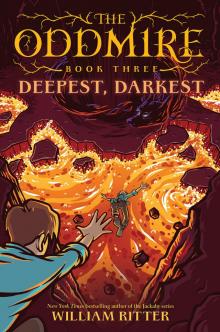 Deepest, Darkest
Deepest, Darkest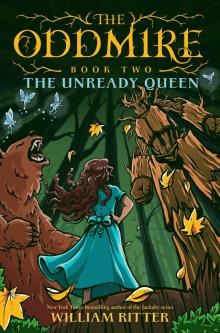 The Unready Queen
The Unready Queen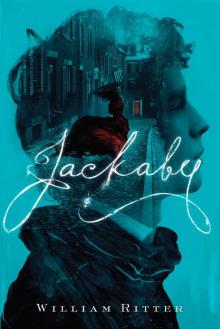 Jackaby
Jackaby Changeling
Changeling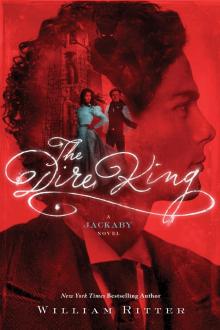 The Dire King
The Dire King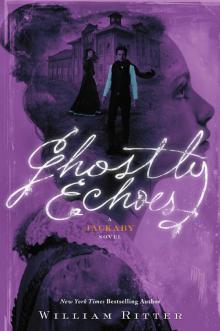 Ghostly Echoes
Ghostly Echoes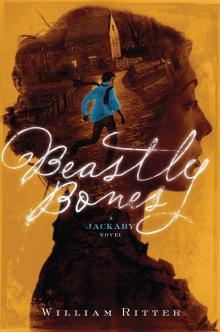 Beastly Bones
Beastly Bones